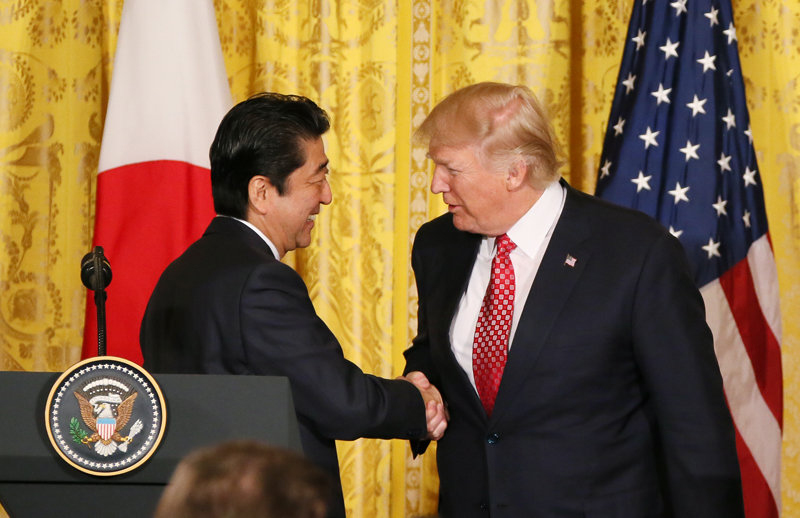Trump’s unorthodox foreign policy alters U.S. influence abroad
Credit: Wikimedia Commons user 内閣官
Japanese Prime Minister Shinzō Abe and President Donald Trump shake hands on February 10, 2017.
April 6, 2017
Even with an ever-changing leadership, the United States usually maintains stable relationships with its friends and allies. However, in a departure from decades of historical precedence, President Trump refused to extend the positions of ambassadors and envoys beyond Inauguration Day, choosing to replace all of Obama’s choices with his own. Touting an “America First” policy that leans toward isolationism and away from the U.S.’ long-standing history of involvement in the global community and the formation of alliances and agreements, Trump’s presidency has already seen major shifts in the our diplomatic relations with other nations. While amity with some nations has grown stronger, many countries feel left out, offended and threatened by Trump’s foreign policy. The repercussions of America losing its position as the dominant force of democracy and in the West in the international community may very well affect the balance of power between nations.
Even before his election, Trump cast doubt on some of America’s strongest diplomatic ties. In an interview, he described the NATO Alliance as “obsolete, because it was, you know, designed many, many years ago,” and that “the countries aren’t paying what they’re supposed to pay.” This view has been criticized as threatening to the autonomy of Europe, which has long seen NATO and America’s unwavering support as indispensable to preventing Russian aggression and annexation, such as the invasion of Crimea. Jens Stoltenberg, Secretary General of NATO, responded to Trump’s comments, asserting, “All allies have made a solemn commitment to defend each other. This is something absolutely unconditioned.” He remains firm that unconditional support for NATO is necessary for the protection of democratic representation in Europe. Though no official comment was made as to whether triggered by White House statements, NATO has placed as many as 300,000 troops on “high alert” in preparation for confrontation with Russia.
With regard to the Pacific region, Trump has expressed unconventional and unprecedented opinions on the treatment of South Korea and Japan. He claimed that South Korea was not paying enough to help keep 28,500 American troops in the country. Despite this, upon taking office, President Trump reasserted the U.S.’ “ironclad” commitment to defend South Korea, agreeing to strengthen joint defense capabilities against North Korea. In a personal meeting with Japanese Prime Minister Shinzō Abe, Trump explained, “It is important that both Japan and the United States continue to invest very heavily in the alliance to build up our defense and our defensive capabilities, which, under our mutual leadership, will become stronger and stronger.” He expressed a desire to use these measures to prevent China’s encroachment of other nations in the Pacific and South China Sea.
However, the issue of Chinese influence in the Pacific is a more complex, economically focused one. Chinese President Xi Jinping explained, “Whether you like it or not, the global economy is the big ocean that you cannot escape from.” As China looks towards globalization and gaining soft power over the economies and governments of other Pacific nations, the Trump administration has taken a far different position. Recently withdrawing from the Trans-Pacific Partnership (TPP), a multilateral trade deal involving several Pacific nations, Trump has demonstrated intentions to value American employment and business over maintaining amicable relations with Pacific nations, per his “America First” policy. Some are concerned that this half-hearted attempt at maintaining political power in the East by only arming strong allies, while disenfranchising less amiable nations, will jeopardize American dominance in the region, and allow China to gain the upper hand.

